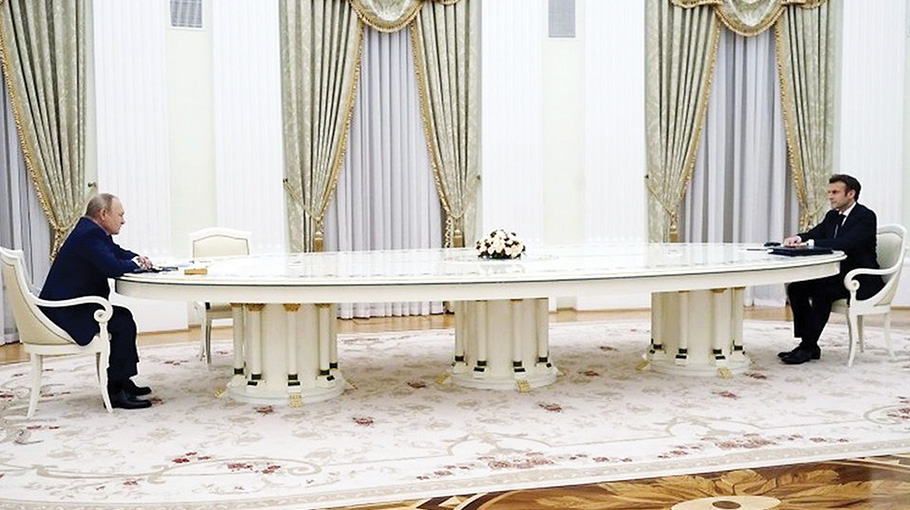Macron says Putin pledges no new Ukraine escalation

French President Emmanuel Macron has told reporters that President Vladimir Putin assured him that Russian forces would not ramp up the crisis near Ukraine's borders.
"I secured an assurance there would be no deterioration or escalation," he said before meeting Ukraine's leader.
However, Russia said any suggestion of a guarantee was "not right".
Russia has denied any plans to invade Ukraine, but it has assembled more than 100,000 troops near its borders.
US officials believe Russia has assembled 70% of military forces needed for a full-scale invasion.
The tensions between Russia, Ukraine and the West come nearly eight years after Russia annexed Ukraine's southern Crimea peninsula and backed a rebellion in the eastern Donbas region.
Moscow accuses the Ukrainian government of failing to implement the Minsk agreement - an international deal sponsored by Germany and France to restore peace to the east, where Russian-backed rebels control swathes of territory and at least 14,000 people have been killed since 2014.
President Macron this week is on a diplomatic tour of national capitals trying to find a solution to the crisis in Ukraine. He arrived in the Ukrainian capital, Kyiv, on Tuesday after almost six hours of talks with Mr Putin in Moscow on Monday.
At a news conference with Ukraine's President Volodymyr Zelensky, Mr Macron said there was now the chance to "make these negotiations move forward" between Russia and Ukraine, and that he could see "concrete solutions" to reducing tensions.
He also said there was a "shared determination" to implement the Minsk agreement. Any resolution to the crisis could take months, he said, but he repeated that Mr Putin had told him he would not be behind any escalation.
Mr Zelensky meanwhile said he expected "in the near future" there would be talks between Russia, France and Germany about resolving the ongoing conflict in eastern Ukraine.
But he called on Mr Putin to take serious measures to reduce tensions. "I do not really trust words, I believe that every politician can be transparent by taking concrete steps," he said.
The Kyiv meeting came after talks between Mr Macron and Mr Putin in Moscow. Mr Putin hinted progress had been made after those discussions, and that some of Mr Macron's proposals "could form the basis of further joint steps" - although they were "probably still too early to talk about".
A French official later told reporters that the two leaders had agreed that Russia would pull troops out of Belarus at the end of exercises taking place near Ukraine's northern borders.
Kremlin spokesman Dmitry Peskov however denied any deal had occurred - although the troops were expected to return to Russia at some point, he said.
President Macron's diplomatic push will later move to Berlin where he will meet the German chancellor, Olaf Scholz, and Polish President Andrzej Duda.
US President Joe Biden met the German leader in Washington on Monday and threatened to shut down a key Russian gas pipeline to Germany if Moscow invaded Ukraine.
UK Prime Minister Boris Johnson has also indicated his support for sanctions. Writing in The Times newspaper on Tuesday, he added that the UK was considering deploying Royal Air Force fighters and Royal Navy warships "to protect south-eastern Europe".
Western countries have already rejected a number of Moscow's demands, including that the Nato defence alliance rule out Ukraine becoming a member, and that it reduce its military presence in eastern Europe.
They have instead suggested other areas of negotiation, for example talks on cutting back nuclear weaponry.
The tensions between Russia and the West were laid bare during Mr Putin's news conference with the French president.
Mr Putin repeated earlier warnings that should Ukraine join the Western military alliance Nato and attempt to take back Crimea - which Russia annexed eight years ago - Europe could get sucked into a major conflict."
"Do you want France to fight with Russia?" he asked French reporters. "That's what will happen. And there will be no winners."
Olaf Scholz - on his first trip to Washington since becoming chancellor and facing criticism for his response to the Ukraine crisis - added that the US and Germany were "absolutely united" on sanctions against Russia should it invade Ukraine, saying "we will do the same steps and they will be very, very hard to Russia".
However, he was more ambiguous about Nord Stream 2 than US President Biden, who said the US "will bring an end" to the controversial pipeline - which will double Moscow's gas exports to Germany - "if Russia invades".
Mr Biden did not give specifics, responding to a question about how he would do this by saying: "I promise you we will be able to do it."
The 1,225km (760-mile) Nord Stream 2 pipeline took five years to build and cost $11bn (£8bn), but as yet has not started operating, after regulators said in November it does not comply with German law and suspended its approval.




